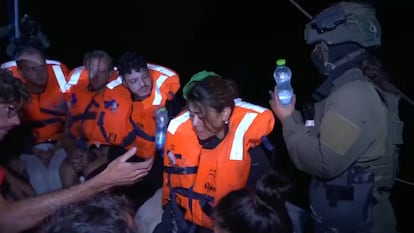Israel intercepts Freedom Flotilla heading to Gaza with humanitarian aid
Activists report being ‘kidnapped’ while in international waters. The Israeli government confirms that Greta Thunberg is ‘safe’


“We’re being attacked! A war crime is being committed.” Brazilian activist Thiago Ávila sounded the alarm on social media around midnight on Monday: the Madleen ship, carrying the Freedom Flotilla and a symbolic shipment of humanitarian aid for Gaza, had been intercepted by the Israeli army. “Greta Thunberg is currently on her way to Israel, safe and in good spirits,” the Foreign Ministry confirmed in a message on X featuring a photo of the Swedish activist being offered a bun by a soldier.
Several of the 12 activists traveling on the Madleen managed to share videos and brief messages from the moment they claim to have been ‘kidnapped’ by Israeli forces. Ávila emphasized that, as the ship was in international waters, Israel has committed a war crime with this operation and by preventing the legitimate arrival of humanitarian aid to Gaza.
Franco-Palestinian MEP Rima Hassan, who was also on board, shared an hourly message on X to record when the vessel lost communication due to the Israeli intervention. “As soon as you stop hearing from us, it means the internet has been cut off and Israel is preparing to attack us. This will give you a better idea of the timing,” she explained. The first was at 11:12 p.m. local time on Sunday, and the third and final one at 1:12 a.m. on Monday.
Shortly after, Hassan published a final image of the ship’s deck, covered in paint-like stains. “A drone above us released a white liquid,” she reported on X. The radio had stopped working due to intentional “jamming,” so they could no longer request help from another vessel. Israeli Defense Minister Israel Katz congratulated the Israel Defense Forces (IDF) on their “swift and safe capture of the Madleen flotilla to prevent them from breaking the blockade and reaching the shores of Gaza.”
According to Katz’s statement, he ordered his soldiers to “show passengers the video of the horrors of the October 7 massacre when they arrive at the port of Ashdod.” He also lashed out, as he had the day before, against the Swedish activist: “It is appropriate that antisemitic Greta and her fellow Hamas supporters see exactly who this terrorist organization they came to support and whom they are working for is.”
For its part, Hamas has condemned the interception of the ship and called the operation “state terrorism” and a “blatant attack on human conscience.” The volunteers, it argued, intended to “break the siege and expose the crime of hunger.” The Freedom Flotilla’s attempt to deliver aid to Gaza means, according to the Islamist party-militia’s media channels, that “Gaza is not alone.”
On Sunday afternoon, when the ship was less than 300 kilometers (185 miles) from the coast of the Palestinian enclave, Katz warned that he had instructed the IDF to act to prevent “the flotilla of hate” from reaching the shores of Gaza. “I have instructed the IDF to act so that the Madleen does not reach Gaza. To the antisemitic Greta and her friends, I say clearly: You should turn back, because you will not reach Gaza,” he added.
In anticipation of the boat’s interception by Israeli forces, the activists had prepared a series of videos in which they stated their names and nationalities, with passports in hand as proof, including that of Spanish volunteer Sergio Toribio. They called on their respective governments to intervene. They also asked citizens to lobby through various channels for their countries’ leaders to take action against Israel.
In this regard, the Freedom Flotilla coalition also emphasized that the Madleen is a UK-flagged civilian vessel and that the UK “has a legal obligation to protect its vessel and the civilians on board from Israeli intervention.” UN Special Rapporteur on Palestine Francesca Albanese made a similar call: “The UK government must urgently seek a full clarification and ensure the immediate release of the vessel and its crew.” She also requested that the vessel be allowed to continue “its legitimate humanitarian mission.”
The Freedom Flotilla was created in 2010 as a peaceful coalition in solidarity with the Palestinian people. Its humanitarian purpose was to bring aid to Gaza during the Israeli blockade of the enclave. That year, a convoy carrying 10,000 tons of aid to the Strip, consisting of six boats with 750 people, was also intercepted by Israeli forces, resulting in a fatal attack: 10 people died and around 20 were injured in the military intervention.
On this occasion, the Freedom Flotilla’s objective was to bring a symbolic amount of food to the starving population of Gaza, primarily rice and infant formula. But above all, its journey represented a symbolic attempt to “open a humanitarian corridor” after months of blockades and obstruction of the entry of goods.
Israel has been preventing the smooth flow of humanitarian aid to the Strip since March 2, when Benjamin Netanyahu’s government imposed a total blockade that lasted more than 80 days. The hunger and shortage crisis was so severe, with the entire population of the territory (2.1 million people, almost half of whom are children) at serious risk of famine due to lack of food, that Israeli authorities opened the door to a limited number of trucks.
However, the UN has repeatedly denounced the insufficient amount of aid reaching Gaza. Israeli forces only allow access to 100 trucks carrying supplies, despite organizations estimating that between 500 and 600 of these vehicles are needed each day to meet the population’s basic needs.
The U.S.- and Israeli-backed Gaza Humanitarian Fund (GHF)’s militarized distribution of food parcels outside the UN does not address Gazans’ food needs, does not provide acceptable safety conditions — more than 100 people have been shot dead while visiting GHF distribution points — and therefore does not comply with fundamental humanitarian principles, according to NGOs and the UN.
Sign up for our weekly newsletter to get more English-language news coverage from EL PAÍS USA Edition
Tu suscripción se está usando en otro dispositivo
¿Quieres añadir otro usuario a tu suscripción?
Si continúas leyendo en este dispositivo, no se podrá leer en el otro.
FlechaTu suscripción se está usando en otro dispositivo y solo puedes acceder a EL PAÍS desde un dispositivo a la vez.
Si quieres compartir tu cuenta, cambia tu suscripción a la modalidad Premium, así podrás añadir otro usuario. Cada uno accederá con su propia cuenta de email, lo que os permitirá personalizar vuestra experiencia en EL PAÍS.
¿Tienes una suscripción de empresa? Accede aquí para contratar más cuentas.
En el caso de no saber quién está usando tu cuenta, te recomendamos cambiar tu contraseña aquí.
Si decides continuar compartiendo tu cuenta, este mensaje se mostrará en tu dispositivo y en el de la otra persona que está usando tu cuenta de forma indefinida, afectando a tu experiencia de lectura. Puedes consultar aquí los términos y condiciones de la suscripción digital.








































